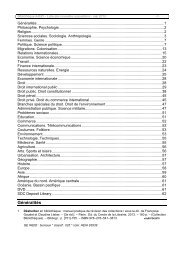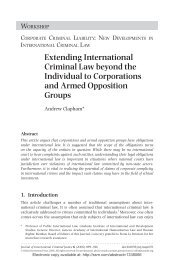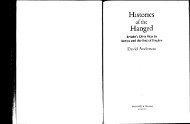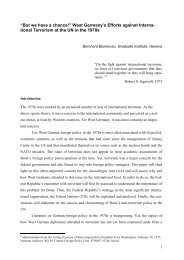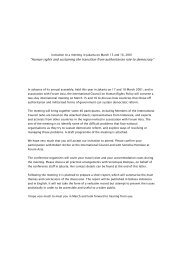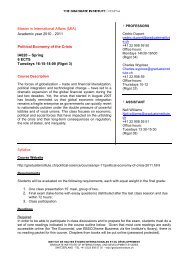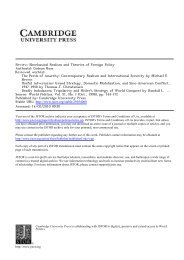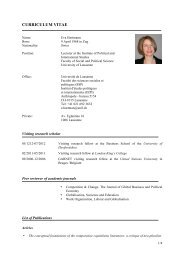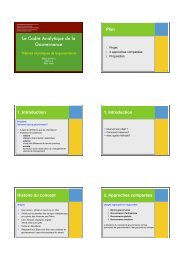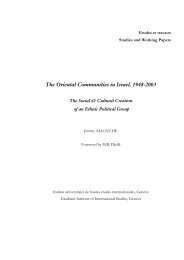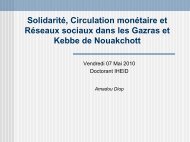The 1953 Coup D'etat in Iran Author(s): Mark J. Gasiorowski Source ...
The 1953 Coup D'etat in Iran Author(s): Mark J. Gasiorowski Source ...
The 1953 Coup D'etat in Iran Author(s): Mark J. Gasiorowski Source ...
Create successful ePaper yourself
Turn your PDF publications into a flip-book with our unique Google optimized e-Paper software.
Int. J. Middle East Stud. 19 (1987), 261-286 Pr<strong>in</strong>ted <strong>in</strong> the United States of America<br />
<strong>Mark</strong> J. <strong>Gasiorowski</strong><br />
THE <strong>1953</strong> COUP D'ETAT IN IRAN<br />
INTRODUCTION<br />
In retrospect, the United States sponsored coup d'tat <strong>in</strong> <strong>Iran</strong> of August 19,<br />
<strong>1953</strong>, has emerged as a critical event <strong>in</strong> postwar world history. <strong>The</strong> government<br />
of Prime M<strong>in</strong>ister Mohammad Mosaddeq which was ousted <strong>in</strong> the coup was the<br />
last popular, democratically oriented government to hold office <strong>in</strong> <strong>Iran</strong>. <strong>The</strong><br />
regime replac<strong>in</strong>g it was a dictatorship that suppressed all forms of popular<br />
political activity, produc<strong>in</strong>g tensions that contributed greatly to the 1978-1979<br />
<strong>Iran</strong>ian revolution. If Mosaddeq had not been overthrown, the revolution might<br />
not have occurred. <strong>The</strong> <strong>1953</strong> coup also marked the first peacetime use of covert<br />
action by the United States to overthrow a foreign government. As such, it was<br />
an important precedent for events like the 1954 coup <strong>in</strong> Guatemala and the 1973<br />
overthrow of Salvador Allende <strong>in</strong> Chile,' and made the United States a key<br />
target of the <strong>Iran</strong>ian revolution.<br />
Although the <strong>1953</strong> coup is thus an important historical event, its story has not<br />
yet been fully told. <strong>The</strong> most widely circulated account of the coup, that of<br />
Kermit Roosevelt, the CIA officer who directed it, conta<strong>in</strong>s many errors and<br />
omissions.2 This study seeks to clarify the roles played by the United States and<br />
Brita<strong>in</strong> <strong>in</strong> the coup, based on recently released diplomatic records and on <strong>in</strong>ter-<br />
views with most of the key U.S. and British participants.3 This account is more<br />
complete than Roosevelt's and the others that have so far appeared. Moreover,<br />
because all of the major U.S. and British participants who are alive and will<strong>in</strong>g<br />
to speak on the subject have been <strong>in</strong>terviewed for this study, and because all of<br />
the currently available U.S. and British diplomatic records deal<strong>in</strong>g with the coup<br />
have been exam<strong>in</strong>ed, this study is likely to rema<strong>in</strong> the most complete account of<br />
U.S. and British <strong>in</strong>volvement <strong>in</strong> the coup for some time to come.<br />
Three ma<strong>in</strong> questions guide this study. First, why did the United States<br />
become <strong>in</strong>volved <strong>in</strong> the coup? Second, what roles did Brita<strong>in</strong> and the various<br />
<strong>Iran</strong>ian participants play? Third, how important was the U.S. role <strong>in</strong> the over-<br />
throw of Mosaddeq? While none of these questions can be answered def<strong>in</strong>itively,<br />
the material presented <strong>in</strong> this study sheds considerable light on each.<br />
THE ANGLO-IRANIAN OIL CRISIS AND BRITISH POLICY TOWARD IRAN<br />
On April 29, 1951, Mohammad Reza Pahlavi, the late Shah of <strong>Iran</strong>, yielded to a<br />
ris<strong>in</strong>g tide of popular pressure and appo<strong>in</strong>ted Mohammad Mosaddeq to be<br />
? 1987 Cambridge University Press 0020-7438/87 $5.00 + .00



![Download [pdf] - The Graduate Institute, Geneva](https://img.yumpu.com/23370020/1/190x248/download-pdf-the-graduate-institute-geneva.jpg?quality=85)
